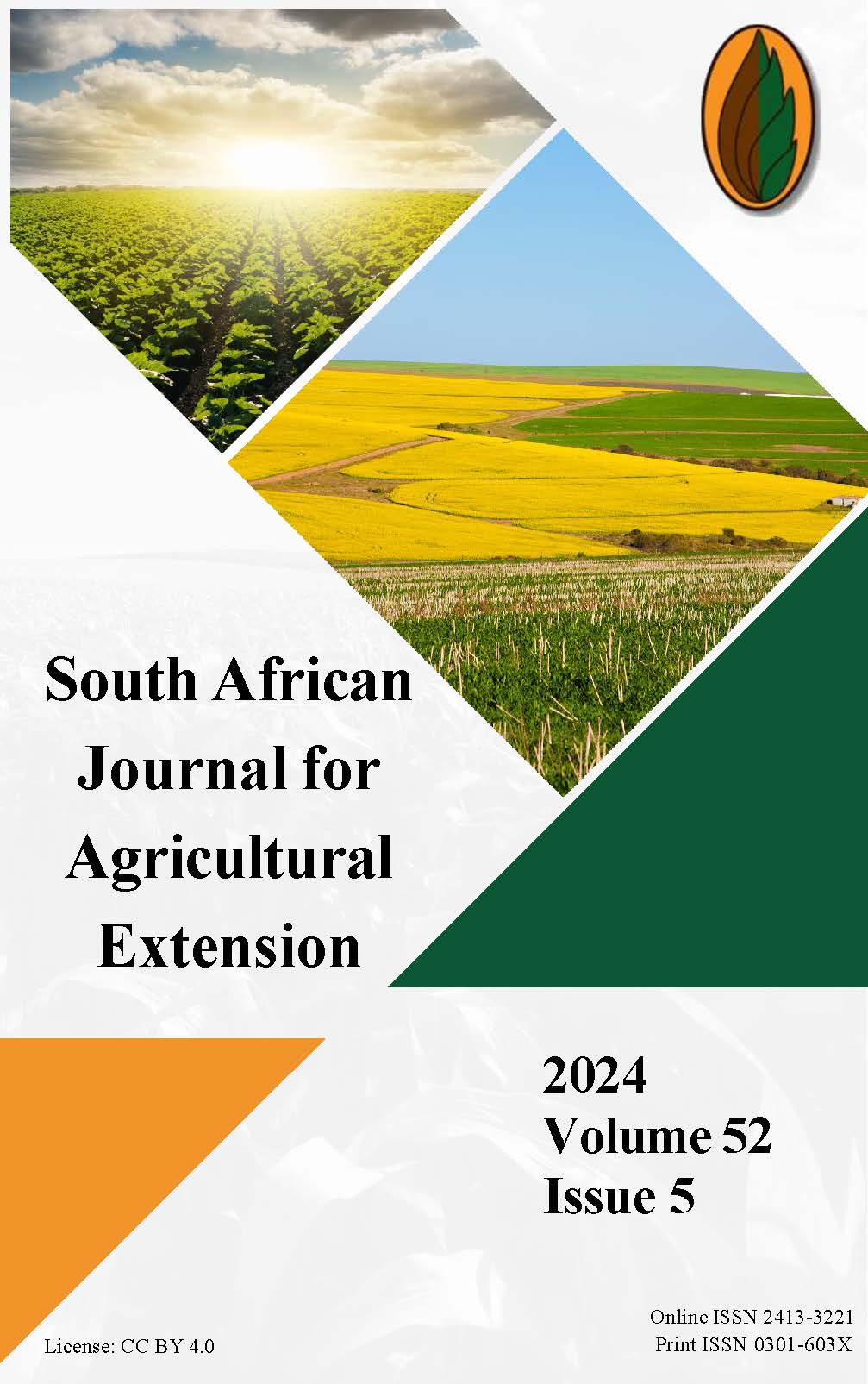Can Agricultural Extension Inspire South African Students to Pursue Careers in Agriculture?
DOI:
https://doi.org/10.17159/2413-3221/2024/v52n5a16297Keywords:
Agricultural Extension, Agriculture Education, Agricultural Sector, Careers, South AfricaAbstract
Agricultural extension and education programs can influence students' decisions to pursue a career in agriculture. Understanding the influence of agricultural extension on students' aspirations to pursue a profession in agriculture is critical for tackling agricultural sector concerns. This paper examines how agricultural extension programs affect students' intentions to pursue a career in agriculture, including their plans to study agriculture, work in the agricultural sector, and start their own agricultural business. Data was collected from 163 postgraduate students from South Africa using Google Forms. The Statistical Package for the Social Sciences version 19 was used to analyse the quantitative data, and content analysis was used to analyse the qualitative data (open-ended questions in the questionnaire). 44.8% of participants mentioned that they chose agriculture to assist farmers and the community, 37.4% for employment, 24.5% for farming, 28.8% for agricultural entrepreneurship, 15.3% for marketing, promotion, and selling agricultural products, 11.7% for university application, and 6.7% to meet family and peer expectations. Approximately a quarter of the participants (25.2%) were dissatisfied with their agricultural educational qualifications. The main reasons participants were not satisfied with their education qualification were that there were limited employment opportunities, and they wanted to study further/obtain a higher qualification. The government and educational institutions must take steps to address the issue of limited employment opportunities. This could include investing in job training programs to help people develop the skills they need for in-demand jobs, working with businesses to create more jobs in high-growth industries, and making it easier for people to start their businesses. This paper recommends that agricultural extension programs in basic education be more interactive and hands-on, allowing students to develop their vision of becoming future agricultural experts.
Downloads
References
BLAKENEY, M., 2022. Agricultural innovation and sustainable development. Sustainability., 14(5): 2698.
CARLISLE, L., MONTENEGRO DE WIT, M., DELONGE, M., ILES, A., CALO, A., GETZ, C., ORY, J., MUNDEN-DIXON, K., GALT, R.E., MELONE, B., KNOX, R. & PRESS, D.M., 2019. Transitioning to sustainable agriculture requires growing and sustaining an ecologically skilled workforce. Front. Sustain. Food Syst., 3(96): 1-8.
CHEN, T., LEE, K., KABRE, P.M. & HSIEH, C., 2020. Impacts of educational agritourism on students' future career intentions: evidence from agricultural exchange programs. Sustainability., 12(22): 2-19.
HAGGARTY, L., 1996. What is content analysis? Medical Teacher., 18(2): 99–101.
KAVGA, A., THOMOPOULOS, V., BAROUCHAS, P., STEFANAKIS, N. & LIOPA-TSAKALIDI, A., 2021. Research on innovative training on smart greenhouse technologies for economic and environmental sustainability. Sustainability., 13(19): 1-22.
MAGAGULA, B. & TSVAKIRAI, C.Z., 2020. Youth perceptions of agriculture: influence of cognitive processes on participation in agripreneurship. Dev. Practice., 30: 234 - 243.
MWANGI, J.K., MATHENGE, D.K. & KIMANI, M.M., 2015. Impact of agricultural extension on farmers' knowledge, attitude and practices in Nyeri County, Kenya. J. Agric. Technol., 11(12): 2317-2328.
OMOTOSHO, A., EMMANUEL, A., AYEGBA, P. & AYOOLA, J., 2020. Impact of Agricultural Education on Students' Career Choice: A Survey. Int. J. Emerg. Technol. Learn., 15: 51-61.
RAI, A.K., RANJAN, A., BHARTI, S.D., SAIKANTH, D.R.K., SURENDER R.S. & GAUTAM, R., 2023. Agricultural Extension's Key Role in Modern Farming: A Review. Asian J. Agric. Ext. Econ. Sociol., 41(9): 475–485.
REZVANFAR, A., GHORBANIAN, M. & SHAFIEE, F., 2014. An Investigation of the behaviour of agricultural extension and education engineering students in Tehran University towards employability. Procedia Soc Behav Sci., 152: 65-69.
ROY, S., 2023. Influencing factors for pursuing agriculture as a career for agriculture undergraduates: A two-stage approach. Entrep. Educ., 6: 169–203.
SINGH, V.P. & SINGH, U.P., 2012. Impact of agricultural extension on farmers' knowledge, attitude and practices in India. J. Agric. Ext., 18(2): 1–13.
SOM, S., BURMAN, R.R., SHARMA, J.P., PADARIA, R., PAUL, S. & SINGH, A.K., 2018. Attracting and retaining youth in agriculture: Challenges and prospects. J. Comm. Mobilization Sustain. Dev., 13: 385-395.
SUPREHATIN, & SHIDIQ, M. (2020). Determinants of agripreneurial career intentions: Evidence from agriculture students. Jurnal Manajemen dan Agribisnis., 17(2).
UTTEJ, D., 2022. Youth in agriculture: Problems and suggestions. Indian Res. J. Ext. Educ., 22(5): 247-250.
WARD, R.D. & LAMMERS, W.J., 2014. The impact of agricultural extension on student attitudes towards agriculture. J. Agric. Educ., 55(1): 82-90.
ZAREMOHZZABIEH, Z., KRAUSS, S.E., D'SILVA, J.L., TIRAIEYARI, N., ISMAIL, I.A. & DAHALAN, D., 2021. Towards agriculture as a career: Predicting students' participation in the agricultural sector using an extended model of the theory of planned behavior. J. Agric. Educ. Ext., 28(1): 67–92.
Downloads
Published
Issue
Section
License
Copyright (c) 2024 L. Maka

This work is licensed under a Creative Commons Attribution 4.0 International License.








.png)